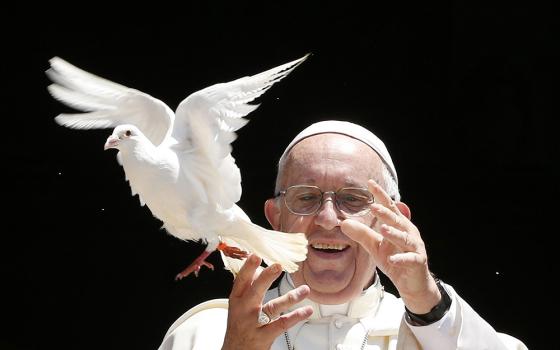Two and a half years ago, when Pope Francis came to the United States, he spoke in front of the National Constitution Center in Philadelphia and voiced his support for our cherished American ideals of equality under the law, religious freedom, and the struggle for justice. Francis said:
“The history of this nation is also the tale of a constant effort, lasting to our own day, to embody those lofty principles in social and political life. We remember the great struggles which led to the abolition of slavery, the extension of voting rights, the growth of the labor movement, and the gradual effort to eliminate every kind of racism and prejudice directed at successive waves of new Americans. This shows that, when a country is determined to remain true to its founding principles, based on respect for human dignity, it is strengthened and renewed.”
As a lawyer, a Catholic Sister, and as executive director of NETWORK Lobby for Catholic Social Justice, I write in defense of our nation’s commitment to religious freedom for all. On Wednesday, a modern battle for religious freedom will reach the highest court in our nation: The Supreme Court will hear oral arguments April 25 in Trump v. Hawaii, which addresses the Trump administration’s efforts to bar people from certain countries, most of them majority-Muslim.
The version of these efforts before the Supreme Court April 25 stops some or all immigrants, refugees and visa holders from Iran, Libya, North Korea, Somalia, Syria, Venezuela, and Yemen from entering the United States, and it is designed to be permanent. It is known commonly as the travel ban or the Muslim ban.
The Supreme Court’s decision on the Muslim ban will test whether all people deserve to be treated with the same dignity, fairness, and respect or whether the government can ban people based on their religion in the name of national security. I believe American Catholics, and all people of faith, must unite with our Muslim neighbors to reaffirm our belief that our diverse religious traditions are what makes America great.
The Muslim ban case cannot be separated from a general rise in anti-Muslim bigotry in our country. President Donald Trump’s explicit bigotry has emboldened hate groups and extremists. Catholics must confront this trend towards hate head on. We are no strangers to resisting religiously-based bigotry. Many of the same arguments used against Muslim Americans are recycled bigotry from anti-Catholic sentiment of years past.
Advertisement
Emboldened by our Constitution’s First Amendment, religious freedom is an ideal that generation after generation of Americans has defended.
In his most recent exhortation, Gaudete Et Exultate, Francis again reminds us of our commitment to our faith teaching over politicking. He says,
“We often hear it said that, with respect to relativism and the flaws of our present world, the situation of migrants, for example, is a lesser issue… That a politician looking for votes might say such a thing is understandable, but not a Christian, for whom the only proper attitude is to stand in the shoes of those brothers and sisters of ours who risk their lives to offer a future for their children.”
Government-sanctioned discrimination against any religious belief is a threat to all religious belief. Our history of anti-Catholic, anti-Semitic, anti-Mormon and other forms of religious bigotry are stains on our national conscience. The rise of anti-Muslim bigotry is yet another. Rejection of religious bigotry shouldn’t have to be sanctioned by the Supreme Court, but here we are.
Catholic-Muslim solidarity in the United States can also serve as a powerful symbol to other parts of the world where followers of our two religions coexist.
During his visit to Egypt last year, Francis spoke about the importance of Christian-Muslim dialogue and collective public witness. He asked that we have
“the courage to accept differences because those who are different, either culturally or religiously, should not be seen or treated as enemies, but rather welcomed as fellow-travelers, in the genuine conviction that the good of each resides in the good of all.” Together with our Muslim neighbors, we can together “counter effectively the barbarity of those who foment hatred and violence.”
While recognizing the threat posed by Trump and anti-Muslim extremists, we also remember what Francis loves about the United States: our commitment to religious freedom.
“In a world where various forms of modern tyranny seek to suppress religious freedom,” Francis said in Philadelphia, “it is imperative that the followers of the various religions join their voices in calling for peace, tolerance and respect for the dignity and rights of others.”
Catholic Americans are united with diverse religious groups in seeing Trump’s attacks on the Muslim community as an attempt to suppress religious freedom. I hope our voices join together that they are loud enough for the Supreme Court to hear us.
[Simone Campbell, a Sister of Social Service, is the executive director of NETWORK Lobby for Catholic Social Justice.]






